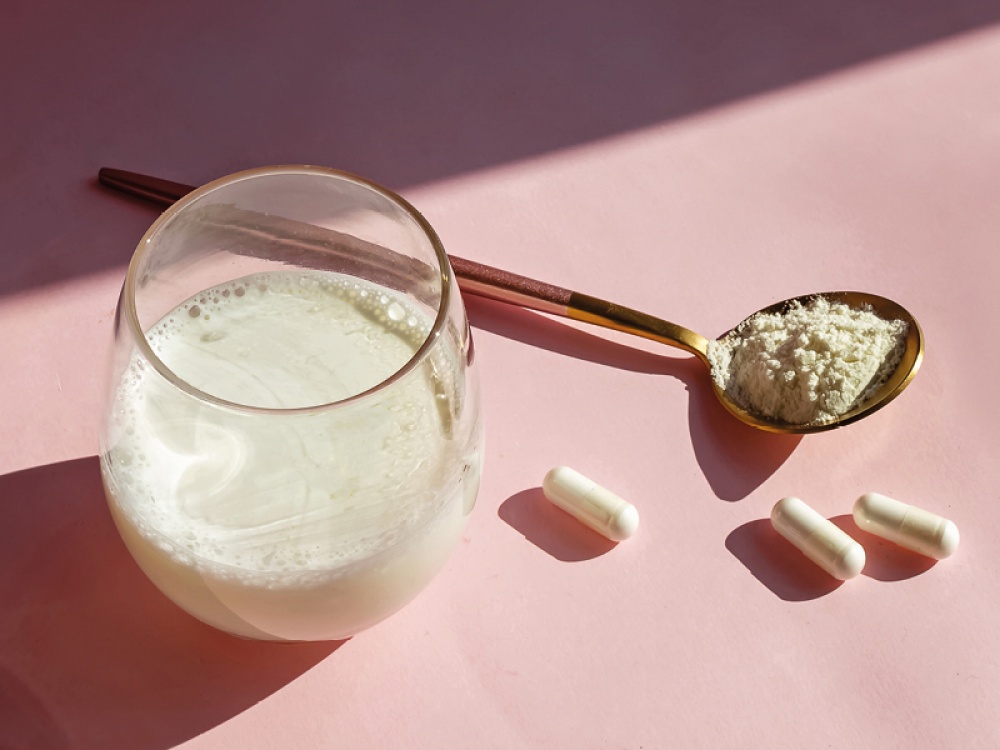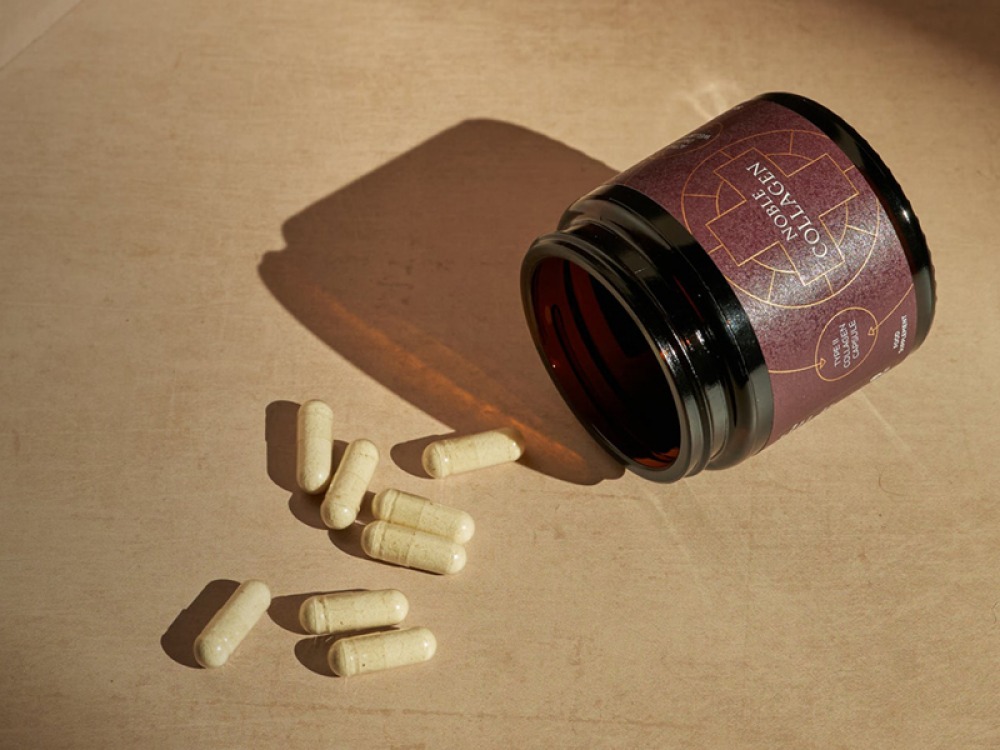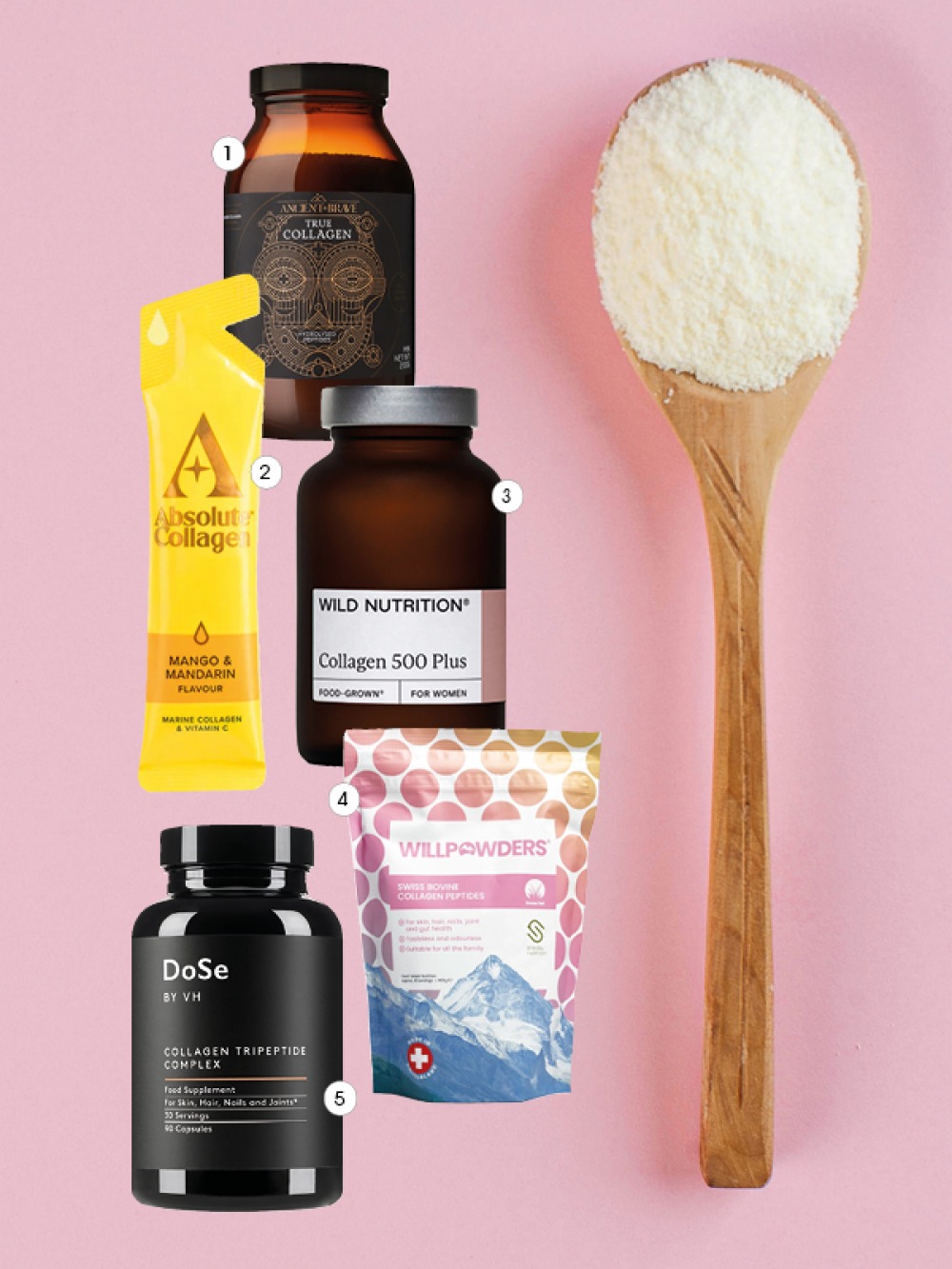What You Need to Know About Collagen Supplements

The collagen supplements you'll want to add to your routine
Chemically speaking, collagen is made up of strong strands of amino acids which are bound tightly together in a rope-like chain. These strong chains are what give young, healthy skin its resilience and plumpness. But as we age we know our collagen depletes, resulting in saggy, crepey skin, thinning hair and brittle nails. But can it be reversed?
Not only does your body produce less collagen as you age, existing collagen begins to break down at a faster rate. The collagen is also lower in quality than when you were younger. Women experience a significant reduction in collagen production after menopause but it’s normal for everyone to experience a decline after 60.

Your lifestyle can also accelerate collagen decline; smoking, sunbathing and eating too much sugar or refined carbs all exacerbate the process. So, obviously, by avoiding these triggers you can help naturally slow the decline. Eating a well-balanced, Mediterranean style diet also helps. But can you really get all the collagen you need from your diet?
There are in fact at least 16 different types of collagen, but the main three include Type 1 found in skin, bones, connective tissue and cartilage (this is the one that is mainly linked to skin ageing). Type 2 relates to the cartilage between your joints and is found in abundance in bone broth. Type 3 helps create muscle structure, organs and blood vessels.
One thing scientists agree on is that collagen can’t be absorbed by your body in its whole form. Your body breaks down the collagen proteins you eat into amino acids. which are then are absorbed into the bloodstream. This then triggers the body’s natural production of collagen. But eating collagen-rich foods doesn’t always directly result in higher collagen levels in your body. There is one significant limitation of getting your nutrients from food alone: you will not get the nutrients you need in a consistently high amount from your food.
There will be days when you get almost none of certain nutrients and days when you get an abundance of everything, depending on what you eat and drink. For your body to keep working at creating and deploying new collagen, you need to give it a consistent supply of the nutrients it needs over a long period of time.
Collagen supplements contain collagen protein which has been broken down into shorter chains of amino acids, known as collagen peptides which can enter your bloodstream to help fuel collagen production, providing a guaranteed source of the exact same quantity of key nutrients every day. Those nutrients are also optimised for maximum bioavailability (hydrolysed collagen) so that they are easily absorbed.
Available as collagen pills, shots, liquid collagen, collagen powder, collagen serum, collagen cream and even chewable gummies, you have a choice of how to take your collagen.
So if consistency is key, and with so many collagen supplements endorsed by celebs and constantly splashed across our media, it’s hard to decide which supplement is best for you, but here are our top five to try.

1 True Collagen, £25.50 (40 servings)
Ancient & Brave
A natural way to nourish the body and skin from within, this highly absorbable powder with hydrolysed Type 1 collagen peptides is an excellent source of protein and a hero product for active lifestyles and positive ageing. In clinical trials 100 percent of participants saw a reduction in fine lines and wrinkles, an improvement in skin firmness, elasticity and hydration, alongside an improvement in muscles and joint mobility and recovery from exercise.
2 Marine Liquid Collagen Drink £27.99
(14 days supply) Absolute Collagen
Claiming to be the UK’s most tested collagen with a robust clinical study, results showed improvements to six key concerns in just six weeks, including firmer skin with fewer fine lines and wrinkles, boosted skin elasticity, and shiny, healthier looking hair. Each 10ml sachet delivers 8000mg of high-quality marine collagen peptides, the optimal daily dose. Mix it into your favourite food or drink, or take it on-the-go straight from the sachet.
3 Collagen 500 Plus, £35
(30 servings) Wild Nutrition
Game changers in this supplement include a breakthrough which radically reduces the molecular weight of collagen peptides to 500 Dalton weight for more effective absorption and Mesoporosil®, an advanced form of silica that’s scientifically shown to accelerate collagen synthesis and repair damaged and old collagen. Higher absorption means lower dosage so you only need three grams (one teaspoon) daily compared to the industry standard of 10 or even 20 grams.
4 Swiss Bovine Collagen Powder, £23
WillPowders
This award-winning collagen powder is comprised of highly bioavailable Type 1 and Type 3 collagen aiding increased absorption for maximum benefit. Taken regularly it helps to lubricate joints and build connective tissue; promote healthier, stronger and younger looking skin, hair and nails, regulate the body’s metabolism and reduce support hormone balance. Simply add to drinks and meals and spread out throughout the day for a maximum daily 30g.
5 DoSe by VH, £45
(90 capsules) Victoria Health
Designed for unmatched absorption (six times the bioavailability of traditional collagen supplements) and maximum efficacy, DoSe Collagen Tripeptide Complex is a collagen supplement with additional science backed nutrients including vitamin C, zinc and biotin, to naturally boost collagen levels and support the health of skin, hair, nails and joints. The enteric coating on the capsules ensures that the active ingredients are protected from stomach acids and are released directly into the intestines, where they are absorbed most effectively.







